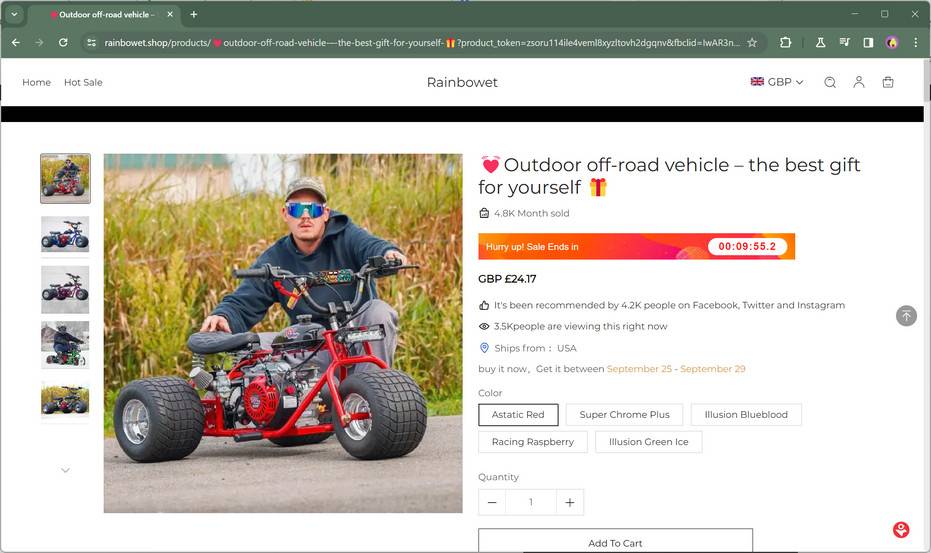A widespread scam has taken over Facebook, promoting the ‘$29 Predator Trike 212cc’ with claims of unbelievably low prices and exaggerated features. However, this is a fraudulent scheme designed to deceive consumers. Here’s what you need to know about this social media scam and how to avoid falling victim.


Scam Overview
The ‘$29 Predator Trike 212cc’ scam operates by creating fake Facebook ads that promote the ‘Predator Trike 212cc’ (also referred to as the TGV Mini Trike Platinum Edition) at absurdly low prices, often as low as $29. These ads tout false claims about the trike’s top speed, engine size, limited time offers, and deep discounts up to 90% off.
The goal is to lure victims to fake websites that mimic real online stores. These scam sites pressure shoppers to enter their credit card information under the guise of processing a purchase for the heavily discounted trike. However, it’s simply a scheme to steal financial data. Victims either receive nothing or a low-quality trike that in no way matches the extravagant claims made in the ads.
This scam takes advantage of Facebook’s massive reach and sophisticated ad targeting tools. By laser-focusing their ads using interests, demographics, and locations, scammers can precisely target those most likely to fall for this motorcycle deal.
The ‘$29 Predator Trike’ scam bears all the classic hallmarks of an online fraud. Warning signs include:
- Prices that seem too good to be true – genuine 212cc mini trikes sell for $1,000+ at retail.
- High-pressure tactics like time-limited deals to create false urgency.
- Claims of deep discounts of up to 90% off retail prices.
- Exaggerated or unbelievable specs like 80+ mph top speeds on a 212cc engine.
- Typos, grammatical errors, and other signs of amateurism.
- Shady “one-product” websites with no company information or history.
- No traceable contact info – just web forms for taking orders.
- Frequent domain changes to avoid detection.
This scam has been rampant on Facebook for years now. Its continued success demonstrates scammers’ ability to evade Facebook’s ad review policies. While the platform has rules against false claims and “get-rich-quick” frauds, new domains and ads emerge constantly.
By understanding the warning signs and tactics, consumers can hopefully avoid being deceived by these Facebook ads and fake websites. Being an informed shopper is the best defense.
How the Scam Works
The ‘$29 Predator Trike 212cc’ scam is intricately designed to take advantage of unsuspecting consumers through deceptive ads and websites. Here is a step-by-step look at how this fraudulent scheme operates.
Bait: Enticing Facebook Ads
The scam begins with eye-catching Facebook ads promoting the 212cc Predator Trike at absurdly low prices. For example, an ad may read:
“🏍Predator Trike – Top Speed 80mph 🏎212cc Racing Engine ⏰Today’s Big Sale 1 pc $29.99 2 pcs $49.99 🔒Free returns and exchanges within 60 days! 🏆5 year warranty. 🛒FUZZYRERGRET.COM🔥LIMITED TIME OFFER💥READY TO RIDE – TGV MINI TRIKE (PLATINUM EDITION)”
These ads are carefully crafted to grab attention and spark interest. They tout unbelievable specs like an 80mph top speed and use persuasion tactics claiming the low prices are for a limited time only.
To boost credibility, they mention details like “free returns” and “5 year warranty” as if this were a legitimate retailer. High-pressure phrases like “LIMITED TIME OFFER” aim to create urgency and push people to act now.
In reality, none of these outlandish claims are true. This is not an authorized seller, there is no company called “FuzzyRergret,” and the prices are completely fabricated. But the ads are powerful enough to entice potential victims to click for more information.
Hook: Fake Ecommerce Sites
Clicking these Facebook ads leads to elaborate scam websites designed to lure victims in further. These sites have domain names like FuzzyRergret.com, FatReio.com, and TrikeMini212.com to appear credible.
The sites feature endless photos and videos of the mini trike in action, along with the same exaggerated claims as the ads. Prices start as low as $29.99 as if they are having a major sale.
These scam sites have a professional design with features like customer reviews, an About Us page, and policies around returns, warranty, and shipping. This builds trust and makes the operation appear 100% legitimate.
In reality, these websites are complete scams built solely to steal credit card information. There is no physical company behind them and all the details are fabricated.
Reel-In: Requesting Payment Information
After luring potential victims in with social media ads and fake sites, it’s time to reel them in.
The scam websites immediately prompt visitors to purchase the heavily discounted trike. There will be countdown timers showing the limited-time deal is expiring soon. Or alerts pop-ups saying high demand is almost sold out.
This creates urgency to purchase immediately before missing out on the incredible deal. Those who try to add the mini trike to their cart are then prompted to enter credit card and billing details to checkout.
The websites claim this is to process payment for the $29 trike. But in reality, it’s just a scheme to harvest financial information. Victims are entering their details into fake forms on scam sites.
The Catch: Charges and No Product
After excitedly entering payment information, victims never receive the wildly discounted trike as advertised. The scam websites are not legitimate retailers, so no order is ever processed.
However, victims’ credit card details are now in the hands of scammers. In best cases, these details are sold on the dark web. But often, scammers will either make fraudulent charges or steal identities.
Some victims eventually receive a low-quality trike that in no way resembles the unrealistic claims in the ads. This helps scammers defend their scam should someone complain.
But the bottom line is – the $29 Predator Trike deal does not exist. It’s a fabricated promotion designed to harvest financial information and steal money. Consumers should be wary of any deal that seems too good to be true.
What to Do If You Are a Victim
Falling for the ‘$29 Predator Trike’ or similar scams can be devastating. However, there are steps you should take right away to minimize damages if you entered payment information:
Contact Your Credit Card Provider Immediately
The top priority is calling your credit card company and reporting fraudulent charges or suspected fraud. Alert them that your card details were entered on a scam website so they can take action. Ask to have your current card cancelled and a new one reissued to prevent additional fraudulent charges.
Credit card providers often have strong fraud protections in place. If reported early, it is possible the provider can stop payments, block suspicious charges, and reverse damages. But act quickly, as the longer the scammers have your information, the more charges they can rack up.
Review Your Statements Carefully
Take time each month to thoroughly review every charge and transaction on your statements. Look for even small charges that seem unusual or that you don’t recognize. Scammers will often test stolen cards with small amounts first before making bigger fraudulent charges.
Request detailed statements that show the vendor name for each charge. Watch for obscure company names you don’t recognize or things like “Trike” that might indicate a scammer testing your card. Report any suspicious activity to your provider right away.
Monitor Your Credit Reports
When card details are stolen, scammers often leverage this to open fraudulent accounts or lines of credit under your name. Pull official credit reports from Equifax, Experian and TransUnion every few months to monitor your file for unauthorized activity.
Look for credit checks, loans, or accounts you don’t recognize. Also verify personal details like your address, employers, etc have not been changed. Report any fraudulent accounts or errors immediately to protect your identity and credit.
Reset Online Account Passwords
Scammers who gain access to payment card information will sometimes leverage this to try resetting the passwords for your online accounts by claiming to be you. As a precaution, take time to reset passwords on your important online accounts like email, banking, social media, etc.
Use strong unique passwords and enable two-factor authentication for an extra layer of security on accounts whenever possible. This protects you in case scammers try accessing other personal information.
Learn From the Experience
While falling victim to scams can be disheartening, try looking at it as a learning experience. Reflect on what drew you to the scam originally and the red flags you may have missed. Scam awareness is the best prevention. Use this as motivation to be an even savvier consumer going forward.
Do some research to understand common online scams circulating presently. Keep the details of this scam handy so you can recognize it if it crosses your path again. Knowledge is power when it comes to protecting yourself and your hard-earned money.
Frequently Asked Questions about the ‘$29 Predator Trike 212cc’ Scam
What is the ‘$29 Predator Trike 212cc’ scam?
This is a fraudulent scheme being promoted on Facebook through ads and fake websites. Scammers create ads offering the ‘Predator Trike 212cc’ mini motorcycle at absurdly low prices like $29 to lure in victims. They then direct targets to elaborate fake sites requesting credit card information under the guise of processing the discounted purchase. However, it is simply a scam to steal financial data.
What are some red flags of this scam?
Warning signs include prices that seem too good to be true (212cc trikes retail for $1000+ normally), exaggerated claims about speed, engine size, etc., high-pressure tactics like limited-time deals, and scammy-looking sites with no legitimate company information.
How does the scam work to trick people?
Scammers bait victims with flashy Facebook ads using persuasion tactics. They then direct them fake ecommerce sites that mimic real online stores with photos, videos, policies, and customer reviews. These sites pressure visitors to purchase quickly and enter credit card info to finalize the deal. However, it’s just a scam to harvest financial details.
What happens after victims enter their payment information?
Victims who enter their credit card information on the scam websites never receive the discounted trike as advertised. At best, their card details are stolen and sold on the dark web. At worst, the scammers steal their identity or rack up fraudulent charges on their account.
What should someone do if they already entered their details?
Immediately contact your credit card company to report fraud and cancel your current card. Carefully review statements for unauthorized charges and report them promptly. Check your credit reports for any unfamiliar accounts or loans opened in your name. And reset the passwords on your online accounts to prevent access in case details were stolen.
How can someone avoid this Predator Trike scam?
Use common sense when evaluating deals online. Research unfamiliar companies and look for obvious scam red flags. Never provide payment information unless you are on the secure site of a reputable retailer. And remember – if an offer seems too good to be true, it almost always is.
Are these scam ads allowed on Facebook?
No – Facebook’s policies prohibit false claims, frauds, and scams. However, new domains and ads are constantly created to evade detection. The best defense is learning the warning signs so you can recognize fraudulent offers.
Conclusion
The ‘$29 Predator Trike 212cc’ deal resurfacing on Facebook is, unfortunately, just another scam aiming to take advantage of enthusiastic shoppers. Outlandish claims of impossibly low prices and exaggerated product specs are clear as day red flags. These scams may evolve and develop new tricks, but armed with the right awareness, consumers have the power to recognize and avoid online scams.
Being a savvy shopper means slowing down and using common sense. If a deal seems outrageously good, that should raise suspicions, not excitement. No legitimate retailer can defy the basic laws of business and offer brand new trikes at a 96% discount overnight. When prices seem radically low, alarm bells should be ringing.
Furthermore, only enter payment information on secure sites of reputable retailers you know and trust. Never provide card details simply because a website asks for it. And look for obvious signs of a scam like grammar errors, no contact information, newly registered domains, and low-quality photos.
The ‘$29 Predator Trike’ deal serves as an important reminder to be cautious when shopping online. Protect yourself by looking out for the warning signs, verifying legitimacy, and trusting your instincts. If an offer seems too good to be true, it almost always is. Make smart decisions to keep your money safe and avoid falling prey to scams.



